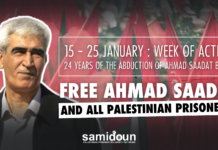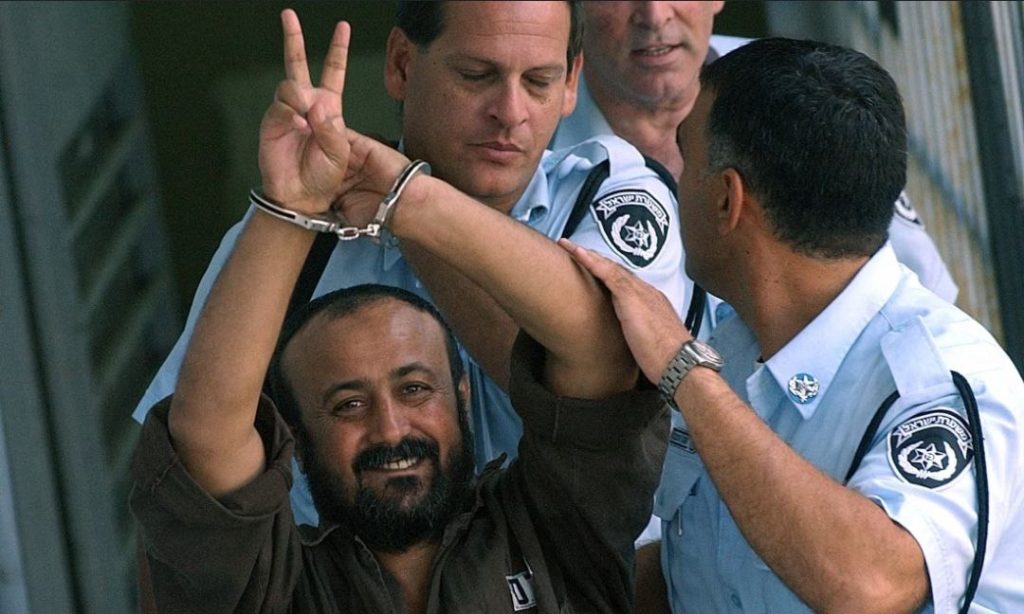
In the latest assault of the leaders of the Palestinian prisoners’ movement — and of the Palestinian resistance behind bars — Marwan Barghouti, a member of the Central Committee of the Fateh movement serving five life sentences plus 40 years in Zionist jails, and a widely recognized leader of the prisoners’ movement whose release is a high priority in a prisoner exchange with the resistance, was beaten by occupation forces on 9 September 2024.
While the assault took place nearly two months ago, the news was revealed only on 27 October. Marwan Barghouti, like other leaders of the prisoners’ movement, is being held in isolation in Megiddo prison, where he was transferred as part of the attack on the prisoners following the Al-Aqsa Flood operation and as the Zionist regime carries out a genocide against the Palestinian people in Gaza. He has been held in isolation in various prisons, including two prisons in the Ayalon-Ramla prison complex, Ohli Kedar and Megiddo prisons.
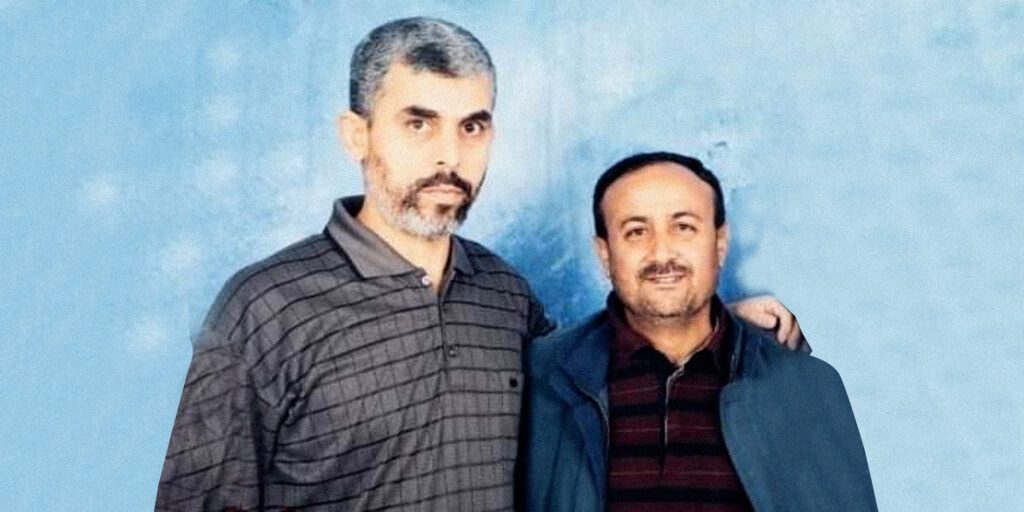
Barghouti’s cell, and that of several prisoners also held in the isolation section, was invaded by the repressive forces of the occupation, which beat him on the head, ears, ribs and limbs. He was bleeding from his right ear and injured in the right arms and ribs, chest and back. He has since endured suffered from ongoing complications with his ear — including an infection caused by a blood clot — as well as severe pain, limited mobility and open, untreated wounds, particularly as he was denied proper medical care after the attack.
In an interview with Al-Mayadeen, Arab Barghouti, Marwan’s son, emphasized that “My father confirms to the Palestinian people and the world that he is steadfast in the face of the occupation, and his only concern is to unify the people,” noting his full confidence in the Palestininan resistance to complete a prisoner exchange, affirming that “the prisoners will be outside the jails, including my father.” He emphasized that despite his father’s physical pain, he came to see his lawyer with his head held high and that his morale was not affected.
This is the latest assault on the leadership of the prisoners’ movement, a series of attacks that can only be interpreted as an open threat — and a potential attempt – of assassination against some of the longest-serving and most prominent Palestinian prisoners.
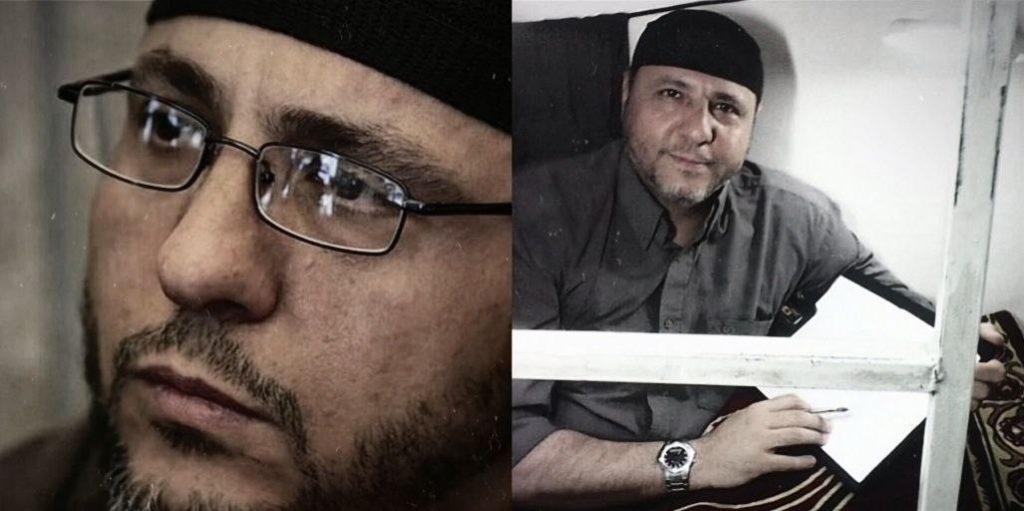
On 20 July 2024, family sources reported that Abdullah Barghouti, the longest-sentenced Palestinian prisoner with 67 life sentences or 5,200 years in prison, was severely beaten in isolation in Shatta prison. He was then transferred from Shatta prison to an unknown and undisclosed location, rather than receiving treatment for the severe assault. Abdullah Barghouti, a leader and engineer in the Izz el-Din al-Qassam Brigades of Hamas, is also one of the prisoners with a very high priority in a prisoner exchange — and one of the leaders that the occupation has repeatedly refused to release.
In May 2024, Adeeb Mustafa Samoudi, a released Palestinian prisoner who had been held in Gilboa prison prior to his liberation, spoke out about a brutal assault by repressive forces on fellow Palestinian prisoners’ movement leader and prominent Al-Qassam Brigades struggler, Ibrahim Hamed. Ibrahim Hamed is serving 54 life sentences in occupation prisons and like both Marwan and Abdullah Barghouti, is a key priority in a prisoner exchange for the Palestinian resistance.
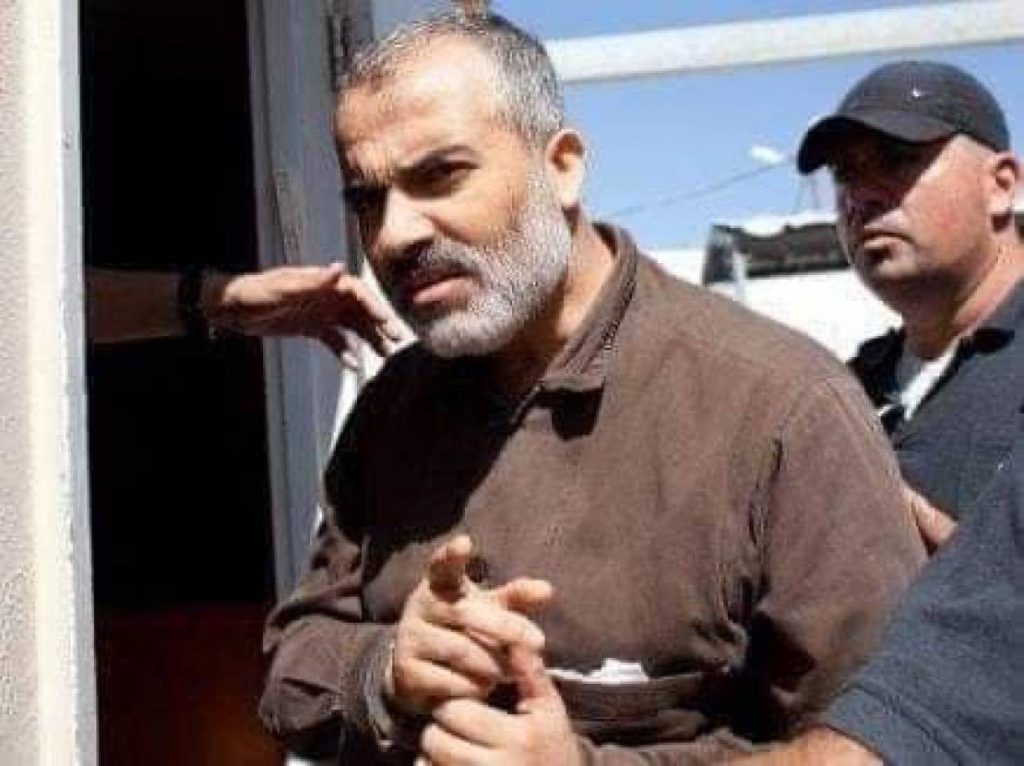
Samoudi said, “Hamed was assaulted in Gilboa prison, and no part of his body is free from bruises, scratches or injuries, and he lost a lot of blood from a head injury. After the guards raided our cell, he was unable to stand and his health condition is very critical. Even if I try to describe the condition in which I left prisoner Hamed, it would not be enough to describe how much his life is in danger due to the violence of the beatings he and other prisoners received in Gilboa prison.” Ibrahim Hamed, one of the most prominent military leaders of the Palestinian resistance of the Al-Aqsa Intifada, was held in solitary confinement for 7 years and is serving the second-longest sentence in Zionist jails, after Abdullah Barghouti.
The full propaganda piece, from Ofer Concentration Camp, as aired on Israeli TV, on Channel 13. Now with subtitles.
Psychopath propagandist Yossi Eli doesn’t even try to hide the satisfaction he gets from watching abducted Palestinians in Israeli torture camps, being beaten and… https://t.co/pGTsEdrYTz pic.twitter.com/NH457x3R5U
— B.M. (@ireallyhateyou) October 9, 2024
On 7 October 2024, on the anniversary of the Al-Aqsa Flood operation — which, of course, held the liberation of Palestinian prisoners through an exchange of captives with the Resistance as one of its objectives — occupation forces engaged in widespread assaults against captive Palestinians and published photos of their inhuman treatment under the direct supervision of the notorious fascist Zionist minister Itamar Ben-Gvir.
In a statement, Hamas, the Islamic Resistance Movement in Palestine, said in response to the publication of these videos and photos:
“We affirm that broadcasting these scenes in conjunction with the first anniversary of the Battle of Al-Aqsa Flood on October 7 is a failed attempt to erase the humiliation and defeat that the occupation has suffered at the hands of our courageous resistance.
The escalating abuse of prisoners, depriving them of their rights, and the continued aggressive policies against them will not break their resolve and iron will. The darkness of the prison will soon give way to the dawn of freedom. Our people and resistance remain loyal to the brave prisoners, no matter the cost.”
In addition to the publicly filmed propaganda assaults, openly using torture and abuse to promote Zionist officials for fascist popular support, repressive units invaded the solitary confinement section of Ramon prison on 7 October and brutally beat and assaulted multiple prominent leaders of the Palestinian prisoners’ movement, including Hassan Salameh, Muammar Shahrour, Ammar Mardi and Mahmoud al-Ardah. All four were then transferred to solitary confinement in Nafha prison.
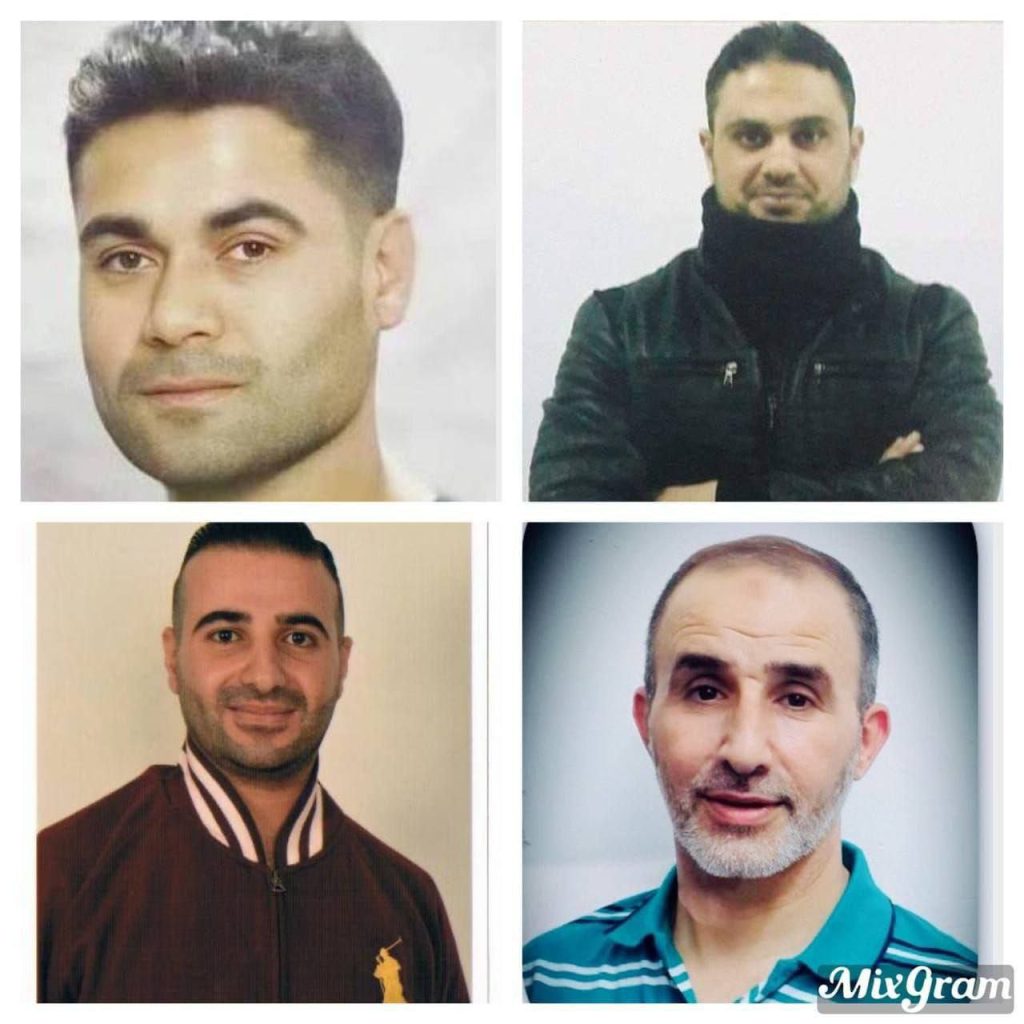
Hassan Salameh, born in 1971 in Khan Younis in Gaza, is a Palestinian refugee from al-Kheima, Ramla. A leader in the Al-Qassam Brigades, he is serving the third-highest sentence in Zionist prisons, with 48 life sentences, following only Abdullah Barghouti and Ibrahim Hamed. Like his fellow prisoner leaders, he has been isolated since 7 October 2023, and he previously spent 13 years in solitary confinement, only returned to his brothers and comrades among the Palestinian prisoners after the Karameh hunger strike of 2012.
Muammar Shahrour, from Tulkarem, was also among those attacked in Nafha prison. Sentenced to 29 life sentences plus 20 years in prison, he is a representative of the Hamas movement to the prisoners’ leadership and representation committees. He comes from a long line of resistance through his family, who have contributed to all of the streams of historical and present-day Palestinian resistance to colonialism and occupation. His grandfather, Hajj Sharif Shahrour, was arrested by the British and served 4 years in prison for his role in the 1936-1939 revolution in Palestine; his uncle, Shawqi Shahrour, established PLO military bases and organized fedayeen brigades transporting ammunition, weapons and fighters between Jordan and Palestine. He served 18 years in Zionist prisons, and young Muammar visited him from an early age. His other uncle, Bassem Shahrour, was martyred in Tunis when the Zionist forces bombed the PLO headquarters there in 1985. He participated in the great popular Intifada as a child from the age of 8, and as a young man joined the resistance with the Al-Qassam Brigades. He was seized by the occupation forces in 2002 after an ongoing battle as he refused to turn himself in; he had previously been pursued by both the Zionist forces as well as the Palestinian Authority “security” forces under their “coordination” with the occupation.
Ammar Mardi, 43, from Ramallah, is, like Marwan Barghouti, a representative of the prisoners of the Fateh movement inside the Zionist prisons, and played an important role in the collective hunger strikes of 2022 and 2023. He served as the Coordinator of the National Higher Committee of the Prisoners’ Movement directing these actions and bringing together all Palestinian forces. He was seized by the occupation on 9 June 2002, while still a political science student at Birzeit University, and sentenced to life imprisonment plus 20 years in prisons. As an influential prisoner and a leader in coordinating with all Palestinian prisoners, he has been held in solitary confinement since 5 November 2023.
Mahmoud al-Ardah, 48, from Arraba, Jenin, is the leader of the Freedom Tunnel operation, in which six Palestinian prisoners escaped from the occupation’s high-security Gilboa prison in September 2021. He and his comrades have been held in solitary confinement since their re-arrest following their escape. A leader in the Islamic Jihad Movement in Palestine, he was first arrested by the occupation in 1992 and was released in 1996. Eight months later, he was arrested again for shooting an occupation military officer invading Salfit and sheltering Saleh Tahayneh, one of the military leaders of the Jihad movement, who had himself escaped from the occupation prisons.
He was sentenced to 99 years in prison, and attempted to escape on multiple occasions, in 2001, 2011, and 2014, before being held in solitary confinement. In 2021, he led the Freedom Tunnel escape, together with Mohammed al-Ardah, Yaqoub Qadri, Ayham Kamamji, Munadil Nafa’at and Zakaria Zubeidi; they were assisted by Iyad Jaradat, Mahmoud Abu Shreim, Ali Abu Bakr, Mohammed Abu Bakr and Qusai Mara’i, all 11 are held in isolation or solitary confinement. Al-Ardah and his fellow Freedom Tunnel prisoners, are like their fellow prisoners’ movement leaders, high priorities for the Palestinian resistance in a prisoner exchange.
Fellow Palestinian prisoners’ movement leaders, like Ahmad Sa’adat, imprisoned General Secretary of the Popular Front for the Liberation of Palestine, serving a 30-year sentence in Zionist jails, and Khalida Jarrar, Palestinian leftist and feminist held in administrative detention, have also been transferred to isolation and solitary confinement as a form of disruption of the prisoners’ movement and collective resistance, as well as a form of torture and abuse aimed at breaking the will of the prisoners.
Of course, all of these attacks come alongside the various manifestations of the genocidal Zionist program in occupation prisons, including the documented martyrdom of 41 Palestinian prisoners inside the occupation jails, with prisoners being beaten to death and deliberately denied medical treatment, from Omar Daraghmeh to Walid Daqqa. This number does not include the multiple reported martyrs who were kidnapped and forcibly disappeared from Gaza and taken to torture and detention camps such as the notorious Sde Teiman.
Over 5,000 Palestinians have been kidnapped from Gaza, where they have been subjected to severe beating, various methods of physical and psychological torture, sexual assault and rape, sleep deprivation, starvation and other forms of abuse and inhuman treatment. They join over 10,000 Palestinian prisoners held in Zionist jails, whose testimonies — as well as the marks on their thin, emaciated bodies — bear witness to the systematic abuse imposed upon them by the Zionist jailers.
The abuse, beating and torture of Palestinian prisoners — and the targeting of leaders of the prisoners’ movement who are widely identified as prominent leaders and symbols of the Palestinian resistance whose release is a high priority in a prisoner exchange — is part and parcel of Zionist genocide and an attempt to continue the assassination policy inside prisons, a policy that has already taken the lives of Sheikh Khader Adnan, Walid Daqqah, Nasser Abu Hmeid, Bassam Sayeh, Ibrahim al-Rai, Saadia Farajallah Matar and over 200 fellow prisoners. The systemic torture and assault of Palestinian prisoners has failed to break the will of the prisoners’ movement and of the Palestinian resistance — and all of the forces of resistance in the region — over decades of Zionist colonialism and, before that, British colonialism.
We urge all supporters of Palestine and the Palestinian cause to speak out actively and take action through demonstrations, mass actions and direct actions to confront the abuse of Palestinian prisoners, including Marwan Barghouti and fellow Palestinian leaders. The imperialist powers, like the US, Canada, Britain, Germany, France and the Netherlands, that continue to arm, support and provide cover for the Zionist genocide in Gaza and its assault on Lebanon, are fully implicated in these inhuman actions.
Indeed, repressive acts by imperialist powers — such as the US’ and Canada’s sanctions on Samidoun on 15 October — are meant to deprive the Palestinian prisoners’ movement of external support and solidarity, to hide the crimes being committed against them and prevent the perpetrators from being held accountable, and to limit, chill and suppress the growing movement for the liberation of Palestinian prisoners as part and parcel of the liberation of Palestine from the river to the sea. They especially seek to repress this movement as the Palestinian resistance has made clear that it insists upon and is committed to a proper prisoner exchange with dignity to release Palestinian leaders and all Palestinian prisoners in the Zionist jails. The repression in the imperial core is also meant as a mechanism of pressure against the Palestinian people, their prisoners and their Resistance.
Our entire movement must respond collectively to such repression by organizing even more loudly, clearly and effectively to shut down the imperialist-Zionist war machine, to support the Palestinian resistance and all forces of resistance in the region, and to ensure that the Palestinian prisoners are not now and will never be isolated from the Palestinian people, the Arab, Islamic and regional liberation causes, and the international movement for justice.
Freedom for all Palestinian prisoners in occupation jails! Victory to the Resistance!
From the river to the sea, Palestine will be free!
Discover more from Samidoun: Palestinian Prisoner Solidarity Network
Subscribe to get the latest posts sent to your email.



